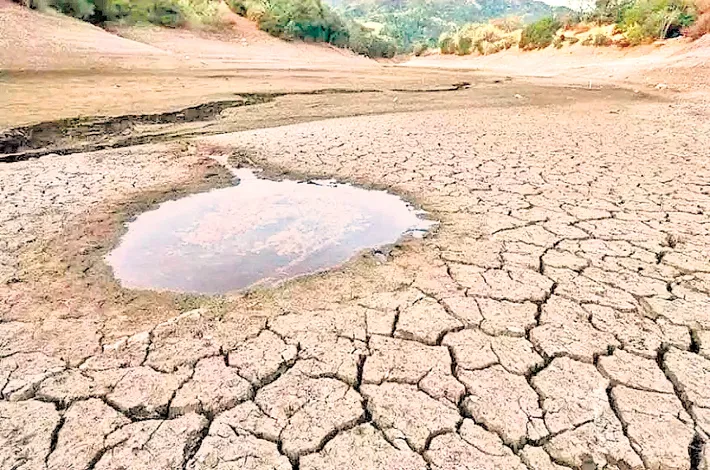Groundwater levels falling drastically in Hyd
13-04-2025 12:00:00 AM

Bachupally has emerged as the most affected area, with groundwater levels plummeting from 6.66 meters in March 2024 to a staggering 38.19 meters in March 2025—a decline of 31.53 meters
EKALAVYA MALLEPALLI | Hyderabad
Hyderabad is facing a severe groundwater crisis, with multiple localities recording significant declines in water levels between March 2024 and March 2025. Despite receiving above-normal rainfall, the city's groundwater reserves continue to deplete, raising concerns about long-term water sustainability.
Bachupally has emerged as the most affected area, with groundwater levels plummeting from 6.66 meters in March 2024 to a staggering 38.19 meters in March 2025—a decline of 31.53 meters. This sharp descent has expanded the critically low groundwater zone to cover 37.03 square kilometers, with nearly 31.7 square kilometers falling under the most affected region.
Kukatpally, a bustling hub in Hyderabad's IT corridor, has also experienced a significant drop in groundwater levels. In January 2025, the average depth to water level reached 25.9 meters, a stark increase from 11.86 meters the previous year. This decline is particularly concerning given the area's role as a residential and commercial nucleus.
Other areas have also reported notable decline in groundwater levels. Tirumalgherry saw a drop of 4.61 meters, while Asifnagar recorded a decrease of 4.09 meters. Medchal experienced a decline of 3.54 meters, and Khairatabad saw a seasonal decrease of 2.97 meters. Quthbullapur recorded a 2.51-meter decline, while Shamirpet and Medipally saw reductions of 1.19 meters and 1.20 meters, respectively. Balanagar, Keesara, and Alwal also reported declines ranging from 1.13 to 1.65 meters.
Officials attribute this widespread depletion to several factors. Over-extraction of groundwater due to rapid urbanization and increased reliance on borewells has led to excessive withdrawal. Inadequate rainwater harvesting systems have further hindered aquifer recharge.
Additionally, urban infrastructure development, including the proliferation of concrete surfaces, has restricted natural water percolation. Climate variability, including changing rainfall patterns and rising temperatures, has also contributed to reduced groundwater replenishment.
The declining groundwater levels pose significant risks to Hyderabad's water security, agriculture, and overall sustainability. Immediate actions are essential to mitigate this crisis. Authorities must enhance rainwater harvesting efforts and enforce strict regulations on borewell installations to prevent over-extraction. Promoting sustainable water practices among citizens and industries is crucial, along with investing in green infrastructure such as parks and open spaces to facilitate natural groundwater recharge.








